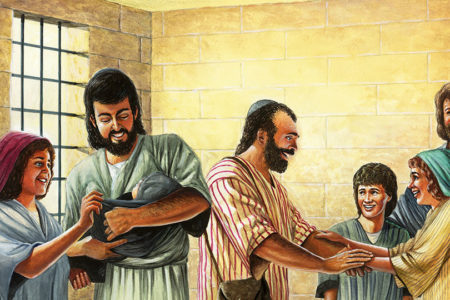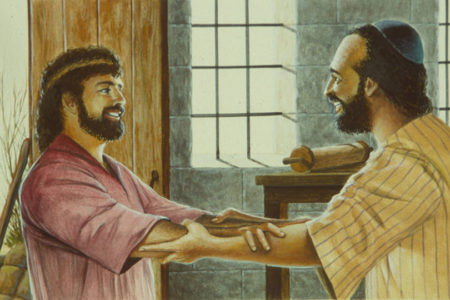The Comfort Of His Coming 1 Thessalonians 1
Comfort is the operative word Paul gave to the suffering saints at Thessalonica. As was often true for first-century Christians, this church was born in affliction and immediately immersed in the caldron of persecution. The grand story of this little epistle is the spectacular triumph of the gospel over withering attacks by Satan and his human conspirators. As we observe their plight and our Lord’s provision through His Word, we too will be comforted and find healing for our souls.
Comfort Concerning Your Faith (3:2)
Timothy was dispatched from Athens “to establish you, and to comfort you concerning your faith.” They were to be steadfast in afflictions, for they were “appointed to these things” (3:3). Even as he had instructed them, they “should suffer tribulation” (3:4) for their faith. As enigmatic as it may seem to some of us they were destined to suffer and forewarned that Satan and his cohorts would bend every effort to make affliction their daily companion. God would allow this in His permissive will in order to accomplish at least two things. (1) He would comfort them and in the process strengthen and establish them in the faith. The Lord was going to bring them through and, while doing so, build them up. (2) Their steadfastness in suffering would become “an example” to other believers (1:7). Suffering has two sides: maturing the sufferer and inspiring and instructing the observer. Two thousand years later, we are beneficiaries of this legacy. Because they suffered, we learn and are encouraged to stand fast in our own trials.
Comfort Concerning Departed Loved Ones (4:18)
The Thessalonians’ perplexity over the departure of loved ones before the Lord’s return evoked an inquiry to Paul about the situation. After all, they had been taught to expect the Lord at any moment. Now, some had died. What was to become of these sleeping saints? Their question contributes immensely to our understanding as, in chapter 4, the Holy Spirit unfolds the glorious theme of rapture and resurrection. The sweeping revelation bears the earmarks of profundity send simplicity—rock-solid theology touching a central theme of the end times—but surpassingly a message of comfort for the hearts of those who have seen loved ones pass into eternity.
Comfort Concerning the Day of the Lord (5:11)
“Wherefore, comfort yourselves together, and edify one another … ”
Confronting in chapter 5, the darker aspects of the Day of the Lord, we see that the saints are a people with a better promise. The day of God’s tribulation wrath will leave the Church unscathed. Our journey will consummate in His presence before that awful day breaks over the surface of the planet. Therefore, we can serve undistracted and give ourselves to edifying one another in the love of Christ and take comfort in His promised soon return for His saints.
The comfort theme carries over into 2 Thessalonians, as the Lord adds a benediction exhorting us to comfort our hearts. This comes after further discussion about the Day of the Lord, when the Holy Spirit assures believers that “our Lord Jesus Christ himself, and God, even our Father, who hath loved us, and hath given us everlasting consolation and good hope through grace, Comfort your hearts, and establish you in every good word and work” (2 Th. 2:16–17).
His comforts, therefore, cover every contingency faced by believers. Armed with the unfolding of His comforting provision, we can plunge into the study of 1 Thessalonians with unbridled anticipation.
Pattern of Saving Faith (1:1–4)
“Remembering without ceasing your work of faith, and labor of love, and patience of hope in our Lord Jesus Christ” (1:3).
Remembering, in a positive sense, is a wonderful word. Paul said he was “Remembering without ceasing” several attributes that had been produced by the gospel in these young Christians. Their lives and the constancy of their faith were a sweet savor to the apostle who had been driven from their midst by persecution. As a matter of fact, the entire epistle reverberates with the joy of one (Paul) who is comforted (3:7) and encouraged by what his message had produced in their lives.
These believers were practicing, very early in their Christian experience, what some of us never seem to learn. That is, the greatest attribute we can manifest is a Christian lifestyle that leaves a testimony to be cherished when remembered by others. The balance and spiritual wholeness, if you will, of these believers is a wonder to behold, given their brief exposure to the teaching of the Word after they were saved. Brevity must certainly have been immersed in intensity as they soaked up every truth Paul set before them, so much so that their lives demonstrated the three key aspects of what the gospel is to produce in the lives of true believers.
1. They “turned to God from idols” (v. 9). This was their “work of faith” (v. 3). It was not the quitting of idol worship that saved them. Pagans could turn from the futility of idol worship and embrace something equally futile. No, the key to their “work of faith” was that they “turned to God.” What a beautiful sequence. Turning to God brought a turning from idols. Forsaking their idols was a direct result of trusting Christ for salvation.
2. Their turning caused them “to serve the living and true God” (v. 9). This was their “labor of love” (v. 3). Their situation rings clear with the sounds of Ephesians 2:10. Those who have been saved freely by His grace (Eph. 2:8–9) are created to an end. “For we are his workmanship, created in Christ Jesus unto good works, which God hath before ordained that we should walk in them.” They were not serving to be saved. They were serving because they were saved. The believer’s good works are the natural outgrowth of what he has become in Christ. To put it another way, we do what we do because, in Christ, we are what we are.
Years ago, someone said it quite well in a few words.
I would not work my soul to save,
For that my Lord has done.
But I would work like any slave,
For love of God’s dear Son.
3. “And to wait for his Son from heaven, whom he raised from the dead, even Jesus, who delivered us from the wrath to come” (v. 10). This hope, “the blessed hope,” was their “patience of hope in our Lord Jesus Christ” mentioned in verse 3. The coming of the Lord was their moment-by-moment hope of hopes. It was the capstone of their Christian experience. As another has well said, “here (1 Th. 1:3) we have the three tenses of the Christian life.”
Past tense: Saved to the uttermost.
Present tense: Serving with every fiber of our beings.
Future tense: Seeking His return with every beat of our hearts.
These believers were living in the full flow of each of these dynamic tenses.
The Power of the Gospel (1:5–8)
Paul’s gospel came to these early believers “in power, and in the Holy Spirit” (v. 5a). In other words, it wasn’t the apostle’s “word only,” but the assurance that the Spirit was working in the hearts and lives of those who received the message. Their commitment was, therefore, to God’s competence empowering His Word.
Then and now, it is easy to miss this indispensable point. So much that is done in the name of Christ is being done in the energy of the flesh—doing His work according to our own desires and designs. One can be certain that at the Bema Seat, if not before, all such work will come to naught.
We are privileged in this generation, as few have been, to see the obvious evidence of the Spirit’s power to move sovereignly in the affairs of men. For example, the Gulf War created circumstances that opened the hearts of thousands of our troops to the gospel. Another case in point is the flinging open of doors for witness in Russia and the failed coup that threatened to close them again. We need not go on. What we can learn is that one can rest in God’s ability to move in power as we proclaim the message of peace.
Paul’s gospel was confirmed in the lives of the men who proclaimed it. “As ye know what manner of men we were among you for your sake. And ye became followers of us, and of the Lord” (vv. 5b–6a). Paul was himself a miraculous testimonial to the power of the gospel. He who formerly ravished the church now lived Christ in such a disarming display of “Christ in you” reality that he could say to them, in all honesty, by becoming “followers of us” you are becoming followers “of the Lord.” Paul was not implying perfection with these words, but he was declaring that true followers of Christ are to set a standard for others to emulate.
How sorely needed and challenging, these words. In our scandal-rocked generation, when Christian leaders are falling from their self-created pedestals with depressing regularity, our mandate is to be steadfast followers of Christ. Forfeiting that obligation is sure to cause havoc in the lives of some who are watching. And, whether we like it or not, people are watching, and some are following each of us.
Producing After Their Kind
“So that ye were an example to all that believe in Macedonia and Achaia. For from you sounded out the word of the Lord … in every place your faith toward God is spread abroad” (vv. 7–8). What a magnificent exhibition of spiritual normality. As in the natural realm, so in the spiritual. Life reproduces after its kind. The power of the gospel had brought life to Paul and his companions. They in turn became the instruments by which new life penetrated pagan darkness in Thessalonica and brought these people to the Lord. Their testimony was “spread abroad” and more “new creations in Christ” were born. The glory of it all is that they are still producing after their kind two thousand years later.
One of the most stunning truths we can appropriate is that when a soul is born into the family of God, He purposes to design an organism that will continue to reproduce until He comes. This reality impressed me vividly while preaching at Bibletown in Boca Raton, Florida, last winter. A children’s choir from India sang for us one evening. Their story was an incredible chronicle of the power of the Word of God. You see, these children were the descendants of a tribe of headhunters in northern India. Someone came to their village one day and left a single Gospel of John in the possession of one man in the village. Through that gospel witness, he came to trust Christ as his Savior. Others followed him into the faith. Generations later, these descendants of the man who received the gospel portion are taking the message of Christ all over the world. And we can be sure that others who are touched by their testimony will keep on reproducing.
For this reason, soul winning is the most rewarding enterprise a Christian is charged to undertake. In this way, even after we are in Heaven, our faith lives on here on earth in the lives of those we have reached for the Lord. There is no better investment to be made this side of glory.
The Longing of the Believer (v. 10)
“And to wait for his Son from heaven, whom he raised from the dead, even Jesus, who delivered us from the wrath to come.”
Their turning “to God from idols, to serve the living and true God” (v. 9) was coupled with their expectancy. They waited for the “Son from heaven.” Three glorious elements are bound up in this fathomless verse.
Their hope: “to wait for his Son.”
Their security: “[Jesus] whom he raised from the dead.”
Their assurance: “delivered … from the wrath to come.”
Because God’s wrath fell on Christ at Calvary, saints need never fear facing “the wrath to come.” The resurrection sets before us the dimensions of our security through Him who suffered in our stead: fully alive in Christ at this moment; destined to don a resurrection body and dwell with Him for eternity. Furthermore, the resurrection is the surety that all He promised will be performed.
The striking note of the blessed hope is the simplicity and serenity it produced in these first-century believers. That Christ may come at any moment to call the Church home was a source of constant assurance and comfort to these oft-beleaguered saints. Their watchword was Maranatha—our Lord, come!
I was standing in the vestibule of a church not long ago greeting people at the conclusion of a service. A lady came by, shook my hand, spoke one word, and continued on her way. The word: Maranatha! I think we would do well to bring that greeting back Jewish people have their word. It’s a good one. We know it well: Shalom—peace. But the word early Church saints adopted says so much more. Maranatha—Come, Prince of Peace.








